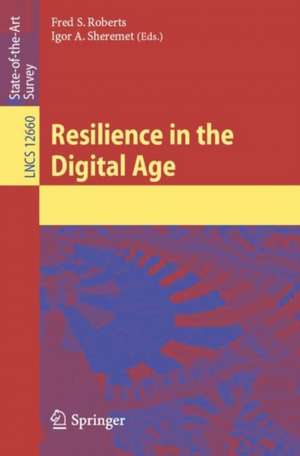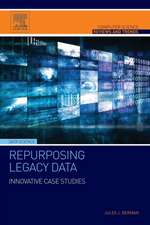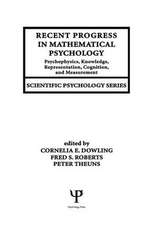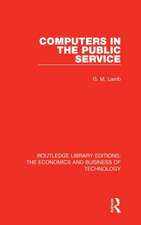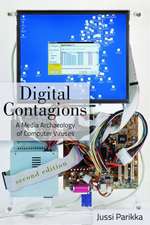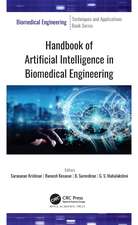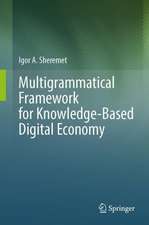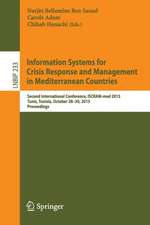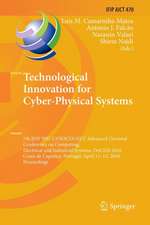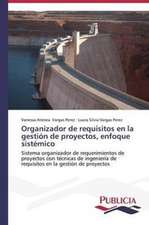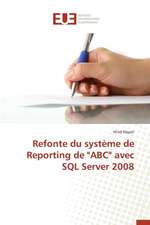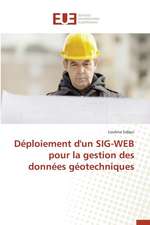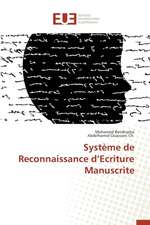Resilience in the Digital Age: Lecture Notes in Computer Science, cartea 12660
Editat de Fred S. Roberts, Igor A. Sheremeten Limba Engleză Paperback – 20 feb 2021
Most of the book’s papers were presented at the Workshop on Big Data and Systems Analysis held at the International Institute for Applied Systems Analysis in Laxenburg, Austria in February, 2020. Their authors are associated with the Task Group “Advanced mathematical tools for data-driven applied systems analysis” created and sponsored by CODATA in November, 2018.
The world-wide COVID-19 pandemic illustrates the vulnerability of our healthcare systems, supply chains, and social infrastructure, and confronts our notions of what makes a system resilient. We have found that use of AI tools can lead to problems when unexpected events occur. On the other hand, the vast amounts of data available from sensors, satellite images, social media, etc. can also be used to make modern systems more resilient.
Papers in the book explore disruptions of complex networks and algorithms that minimize departure from a previous state after a disruption; introduce a multigrammatical framework for the technological and resource bases of today’s large-scale industrial systems and the transformations resulting from disruptive events; and explain how robotics can enhance pre-emptive measures or post-disaster responses to increase resiliency. Other papers explore current directions in data processing and handling and principles of FAIRness in data; how the availability of large amounts of data can aid in the development of resilient STSs and challenges to overcome in doing so. The book also addresses interactions between humans and built environments, focusing on how AI can inform today’s smart and connected buildings and make them resilient, and how AI tools can increase resilience to misinformation and its dissemination.
Din seria Lecture Notes in Computer Science
- 20%
 Preț: 1061.55 lei
Preț: 1061.55 lei - 20%
 Preț: 307.71 lei
Preț: 307.71 lei - 20%
 Preț: 438.69 lei
Preț: 438.69 lei - 20%
 Preț: 579.30 lei
Preț: 579.30 lei -
 Preț: 410.88 lei
Preț: 410.88 lei - 17%
 Preț: 427.22 lei
Preț: 427.22 lei - 20%
 Preț: 596.46 lei
Preț: 596.46 lei - 15%
 Preț: 448.04 lei
Preț: 448.04 lei - 20%
 Preț: 353.50 lei
Preț: 353.50 lei -
 Preț: 389.49 lei
Preț: 389.49 lei - 20%
 Preț: 309.90 lei
Preț: 309.90 lei - 20%
 Preț: 645.28 lei
Preț: 645.28 lei - 20%
 Preț: 763.23 lei
Preț: 763.23 lei - 15%
 Preț: 580.46 lei
Preț: 580.46 lei - 20%
 Preț: 310.28 lei
Preț: 310.28 lei - 20%
 Preț: 655.02 lei
Preț: 655.02 lei - 20%
 Preț: 1183.14 lei
Preț: 1183.14 lei - 20%
 Preț: 340.32 lei
Preț: 340.32 lei -
 Preț: 449.57 lei
Preț: 449.57 lei - 20%
 Preț: 591.51 lei
Preț: 591.51 lei - 18%
 Preț: 938.83 lei
Preț: 938.83 lei - 20%
 Preț: 337.00 lei
Preț: 337.00 lei - 20%
 Preț: 649.50 lei
Preț: 649.50 lei - 20%
 Preț: 607.40 lei
Preț: 607.40 lei - 20%
 Preț: 1414.79 lei
Preț: 1414.79 lei - 20%
 Preț: 1024.44 lei
Preț: 1024.44 lei - 20%
 Preț: 583.40 lei
Preț: 583.40 lei - 20%
 Preț: 453.32 lei
Preț: 453.32 lei - 20%
 Preț: 575.49 lei
Preț: 575.49 lei - 20%
 Preț: 1075.26 lei
Preț: 1075.26 lei - 20%
 Preț: 585.88 lei
Preț: 585.88 lei - 20%
 Preț: 825.93 lei
Preț: 825.93 lei - 17%
 Preț: 360.20 lei
Preț: 360.20 lei - 20%
 Preț: 763.23 lei
Preț: 763.23 lei - 20%
 Preț: 340.32 lei
Preț: 340.32 lei - 20%
 Preț: 504.58 lei
Preț: 504.58 lei - 20%
 Preț: 369.13 lei
Preț: 369.13 lei - 20%
 Preț: 580.93 lei
Preț: 580.93 lei - 20%
 Preț: 343.62 lei
Preț: 343.62 lei - 20%
 Preț: 350.21 lei
Preț: 350.21 lei - 20%
 Preț: 583.40 lei
Preț: 583.40 lei - 20%
 Preț: 583.40 lei
Preț: 583.40 lei - 15%
 Preț: 438.59 lei
Preț: 438.59 lei - 20%
 Preț: 341.95 lei
Preț: 341.95 lei - 20%
 Preț: 238.01 lei
Preț: 238.01 lei - 20%
 Preț: 538.30 lei
Preț: 538.30 lei
Preț: 385.18 lei
Preț vechi: 481.48 lei
-20% Nou
Puncte Express: 578
Preț estimativ în valută:
73.73€ • 80.11$ • 61.97£
73.73€ • 80.11$ • 61.97£
Carte tipărită la comandă
Livrare economică 21 aprilie-05 mai
Preluare comenzi: 021 569.72.76
Specificații
ISBN-13: 9783030703691
ISBN-10: 303070369X
Pagini: 199
Ilustrații: XII, 199 p. 43 illus., 35 illus. in color.
Dimensiuni: 155 x 235 mm
Greutate: 0.3 kg
Ediția:1st ed. 2021
Editura: Springer International Publishing
Colecția Springer
Seriile Lecture Notes in Computer Science, Information Systems and Applications, incl. Internet/Web, and HCI
Locul publicării:Cham, Switzerland
ISBN-10: 303070369X
Pagini: 199
Ilustrații: XII, 199 p. 43 illus., 35 illus. in color.
Dimensiuni: 155 x 235 mm
Greutate: 0.3 kg
Ediția:1st ed. 2021
Editura: Springer International Publishing
Colecția Springer
Seriile Lecture Notes in Computer Science, Information Systems and Applications, incl. Internet/Web, and HCI
Locul publicării:Cham, Switzerland
Cuprins
Resilience of SocioTechnological Systems.- Resilience Algorithms in Complex Networks.- Application of the Multigrammatical Framework to the Assessment of Sustainability and Recoverability of Large – Scale Industrial Systems.- Vulnerability Assessment of Digitized Socio-Technological Systems via Entropy Two-stage Nonsmooth Stochastic Optimization And Iterative Stochastic Quasigradient Procedure for Robust Estimation, Machine Learning and Decision Making.- Robotic Deployments for Disaster Response.- Data Science and Resilience.- Big Data and FAIR Data for Data Science.- Data Science and Resilience.- Building Resilience into Metadata-based ETL Process Using Open Source Big Data Technologies.- Applications.- Democratizing Human-Building Simulation and Analytics.- The Adequacy of Artificial Intelligence Tools to Combat Misinformation.
Textul de pe ultima copertă
The growth of a global digital economy has enabled rapid communication, instantaneous movement of funds, and availability of vast amounts of information. With this come challenges such as the vulnerability of digitalized sociotechnological systems (STSs) to destructive events (earthquakes, disease events, terrorist attacks). Similar issues arise for disruptions to complex linked natural and social systems (from changing climates, evolving urban environments, etc.). This book explores new approaches to the resilience of sociotechnological and natural-social systems in a digital world of big data, extraordinary computing capacity, and rapidly developing methods of Artificial Intelligence.
Most of the book’s papers were presented at the Workshop on Big Data and Systems Analysis held at the International Institute for Applied Systems Analysis in Laxenburg, Austria in February, 2020. Their authors are associated with the Task Group “Advanced mathematical tools for data-driven applied systems analysis” created and sponsored by CODATA in November, 2018.
The world-wide COVID-19 pandemic illustrates the vulnerability of our healthcare systems, supply chains, and social infrastructure, and confronts our notions of what makes a system resilient. We have found that use of AI tools can lead to problems when unexpected events occur. On the other hand, the vast amounts of data available from sensors, satellite images, social media, etc. can also be used to make modern systems more resilient.
Papers in the book explore disruptions of complex networks and algorithms that minimize departure from a previous state after a disruption; introduce a multigrammatical framework for the technological and resource bases of today’s large-scale industrial systems and the transformations resulting from disruptive events; and explain how robotics can enhance pre-emptive measures or post-disaster responses to increase resiliency. Other papers explore current directions indata processing and handling and principles of FAIRness in data; how the availability of large amounts of data can aid in the development of resilient STSs and challenges to overcome in doing so. The book also addresses interactions between humans and built environments, focusing on how AI can inform today’s smart and connected buildings and make them resilient, and how AI tools can increase resilience to misinformation and its dissemination.
Most of the book’s papers were presented at the Workshop on Big Data and Systems Analysis held at the International Institute for Applied Systems Analysis in Laxenburg, Austria in February, 2020. Their authors are associated with the Task Group “Advanced mathematical tools for data-driven applied systems analysis” created and sponsored by CODATA in November, 2018.
The world-wide COVID-19 pandemic illustrates the vulnerability of our healthcare systems, supply chains, and social infrastructure, and confronts our notions of what makes a system resilient. We have found that use of AI tools can lead to problems when unexpected events occur. On the other hand, the vast amounts of data available from sensors, satellite images, social media, etc. can also be used to make modern systems more resilient.
Papers in the book explore disruptions of complex networks and algorithms that minimize departure from a previous state after a disruption; introduce a multigrammatical framework for the technological and resource bases of today’s large-scale industrial systems and the transformations resulting from disruptive events; and explain how robotics can enhance pre-emptive measures or post-disaster responses to increase resiliency. Other papers explore current directions indata processing and handling and principles of FAIRness in data; how the availability of large amounts of data can aid in the development of resilient STSs and challenges to overcome in doing so. The book also addresses interactions between humans and built environments, focusing on how AI can inform today’s smart and connected buildings and make them resilient, and how AI tools can increase resilience to misinformation and its dissemination.
Caracteristici
Contains new theoretical and applied results and surveys in the area of resilience of digitized STSs Explains how robotics can enhance pre-emptive measures to increase resilience Contributions by well-known experts in the field
